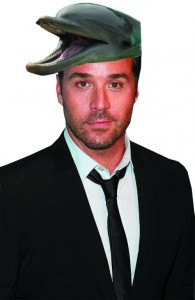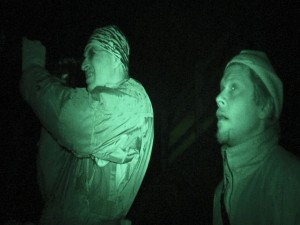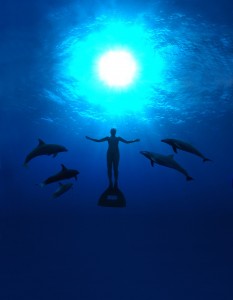A review and podcast on The Cove
Below you’ll find a review of Louie Psihoyos’ documentary, The Cove. I’m also including a podcast about the film which I conducted with famed dictator Pol Pot, the former Prime Minister of Cambodia.
Click the play icon to listen to the podcast.
Or you can download the podcast here.
(Right-click, Save Link As…)

Actor Jeremy Piven certainly understands the importance of keeping the human population and dolphins mercury-free.
The use of the yellow peril stereotype is one of the most effective ways of alienating your audience from your message. Unless, of course, that particular audience hates yellow people.
Louie Psihoyos’ documentary about dolphin killing in Japan, The Cove, doesn’t quite go as far to position the Japanese as backwards, funny-accented, uptight murderers, but it gets perilously close. Certain scenes might as well have the evil Japanese bureaucrats twiddling their yellow mustaches and ordering Flipper genocide (the anti-hero at the center of The Cove, Richard O’Barry, was the original dolphin trainer for the Flipper TV show, now trying to make amends). This point-of-view is a shame because The Cove is filled with horrifying imagery, one shot from below has dying dolphins swimming away in fear and then they are obscured by the blood drenched water.
 The constant stacking of the deck undermines The Cove; it gives the shocking moments a different meaning, as if they should be accompanied by insidious voiceover (“the seas ran red with blood,” references to Evil Dead 2 are always appropriate). The way that Psihoyos has structured his movie, a self-described Ocean’s Eleven-style mission to expose the small fishing village in Taijii, Japan, where the fishermen are selfishly slaughtering dolphins for minimal profits (the cute dolphins are sold to places like Seaworld) and to poison school children (because of the high levels of mercury found in the meat), using Olympic-level divers, sound and camera experts, and an actual special effects wizard from Industrial Light and Magic, makes it seem like he’s positing his group as proof that there’s nothing that American technology and self-righteousness can’t fix.
The constant stacking of the deck undermines The Cove; it gives the shocking moments a different meaning, as if they should be accompanied by insidious voiceover (“the seas ran red with blood,” references to Evil Dead 2 are always appropriate). The way that Psihoyos has structured his movie, a self-described Ocean’s Eleven-style mission to expose the small fishing village in Taijii, Japan, where the fishermen are selfishly slaughtering dolphins for minimal profits (the cute dolphins are sold to places like Seaworld) and to poison school children (because of the high levels of mercury found in the meat), using Olympic-level divers, sound and camera experts, and an actual special effects wizard from Industrial Light and Magic, makes it seem like he’s positing his group as proof that there’s nothing that American technology and self-righteousness can’t fix.
Psihoyos’ choice of aping Errol Morris’ style (The Thin Blue Line, The Fog of War), especially in the use of ponderous, sneaky music score, gets him in trouble, as he’s not nearly the filmmaker Morris is. Psihoyos has a real problem with repetition, as one talking head after another says practically the same exact thing throughout (“if we can’t stop this slaughtering, I don’t know what we’ll do), undermining building much in the way of tension. There’s even footage of the fisherman relaxing with a cigarette directly after their orgiastic killings, laying it on way too thick.
 Even so, The Cove is well worth squirming through, to learn about dolphins as creatures (when in captivity, they require constant Maalox for their ulcers), the funny scenes of O’Barry lying directly to the local Taijii police about his reason for being in the area, (they remain on his and his crew’s tail at all times), the spinelessness of bought and paid for representatives of Caribbean countries supporting Japan’s wishes to remove the International Whale Commission’s ban on whale killing (See? Not all the villains are Japanese, some of them are poor and black too!), and the post-credits scene which proves the repeated edict that “everyone likes balloons.”
Even so, The Cove is well worth squirming through, to learn about dolphins as creatures (when in captivity, they require constant Maalox for their ulcers), the funny scenes of O’Barry lying directly to the local Taijii police about his reason for being in the area, (they remain on his and his crew’s tail at all times), the spinelessness of bought and paid for representatives of Caribbean countries supporting Japan’s wishes to remove the International Whale Commission’s ban on whale killing (See? Not all the villains are Japanese, some of them are poor and black too!), and the post-credits scene which proves the repeated edict that “everyone likes balloons.”



